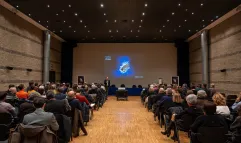Cannes, January 3, 2024 – Last year saw a surge in innovation and New Space initiatives, as well as sustained efforts from governments and space agencies to step up to the crucial challenges of sovereignty, security, connectivity and environmental protection. Thales Alenia Space, the joint venture between Thales (67%) and Leonardo (33%), looks back on a stellar year of accomplishments for the space sector’s future.
Space to Connect: connecting the globe and bridging the digital divide

EUTELSAT KONNECT VHTS © Thales Alenia Space
In 2023, Thales Alenia Space confirmed its commitment to bridging the digital divide. The EUTELSAT KONNECT VHTS and EUTELSAT 10B satellites, for which it was prime contractor, are delivering cutting-edge connectivity to underserved regions, notably across Europe, Africa and the Middle East, as well as the Atlantic and Indian Oceans.
In the same vein, the historic agreement to build Chinggis Sat, the Mongolian national satellite communications system, promises to bring nationwide high-speed Internet connectivity to support telemedicine, e-learning and e-government services, while driving growth in high-added-value sectors of the economy.
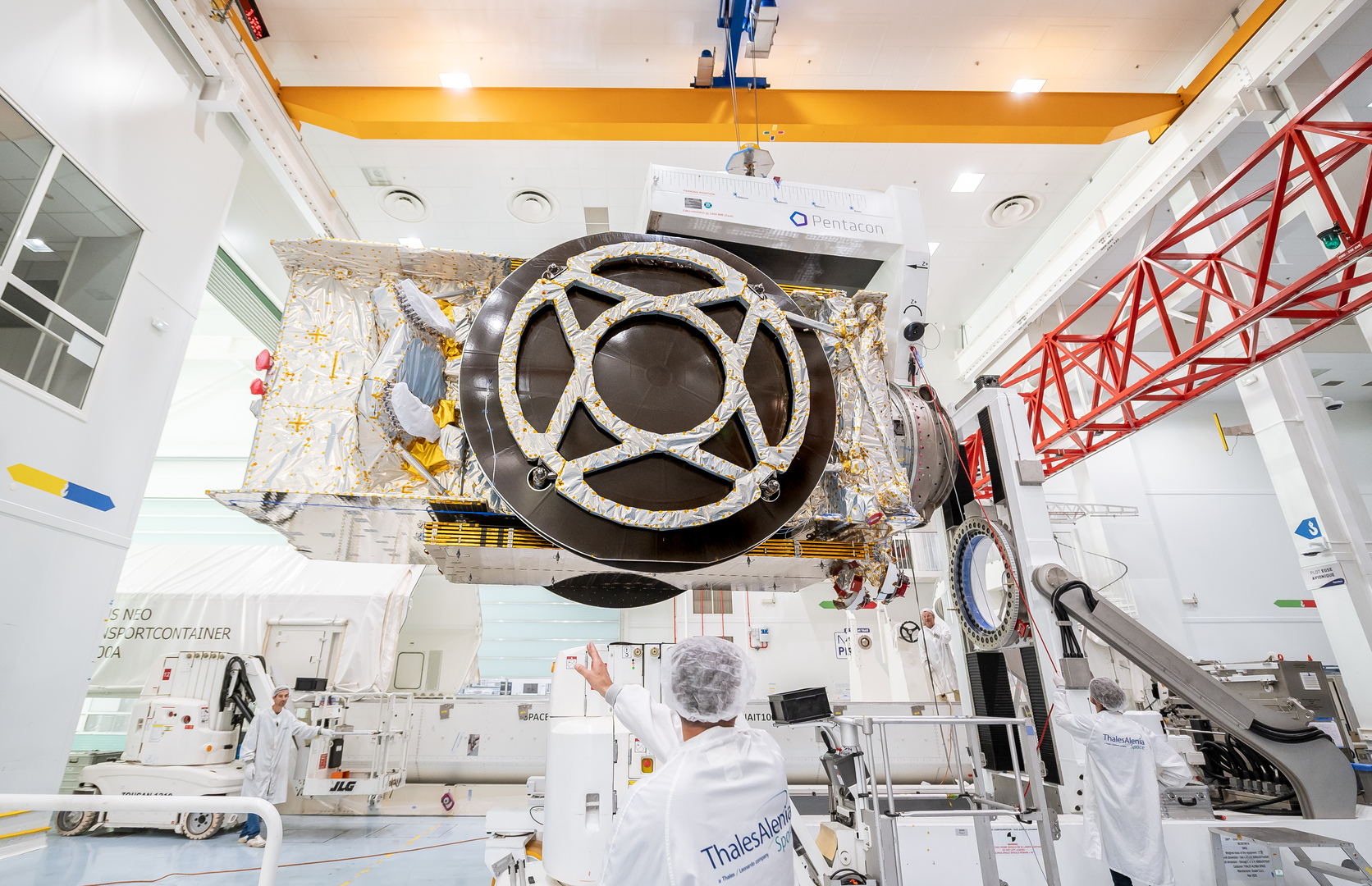
SATRIA © Thales Alenia Space/Imag[IN]
Two other communications satellites launched in 2023 were AMAZONAS-NEXUS, already boosting connectivity in the Americas, and SATRIA, delivering communications services to underserved “notspots” across the 17,500 islands of the Indonesian archipelago.
Space to Explore: first permanent multipurpose lunar habitat and success of the Euclid mission

Multi-Purpose Habitat © Thales Alenia Space
Thales Alenia Space won a major contract with the Italian space agency ASI for the Multi-Purpose Habitat (MPH), the first permanent lunar base of its kind. This award strengthens Thales Alenia Space’s leadership position in the design of habitat modules for crewed space exploration, for which it is already developing the ESPRIT, I-HAB and HALO pressurized modules for the Lunar Gateway, and the modules for the Axiom commercial space station, the first of which is scheduled for launch in 2026.

Euclid © Thales Alenia Space
Launched in July, the Euclid scientific satellite has beamed back its first high-definition images from orbit around the L2 Lagrange point in the Sun-Earth system. Captured from more than 10 billion light-years away, these breathtaking images are the first in a long series aimed at mapping the universe in three dimensions.

First images delivered by Euclid © ESA
Thales Alenia Space also played a key role in developing technologies for the European Space Agency’s European Service Module (ESM) for the Orion capsule. With launch scheduled from 2024, the second ESM will be on the Artemis II mission that plans to fly around the Moon and back to Earth. This mission will be the first to fly a crew of astronauts beyond low Earth orbit since Apollo 17 in 1972.
Space to Travel and Navigate: core satellite navigation capabilities — from MEOLUT Next to Galileo 2nd Generation (G2G)
MEOLUT Next has enhanced search-and-rescue (SAR) capabilities in Thailand and Vietnam, through its ability to detect and locate distress signals on land, at sea and in the air from as far away as 5,000 kilometers.
Thales Alenia Space also signed contracts to maintain the EGNOS V2 system and to develop the mission ground segment for Galileo 2nd Generation (G2G), set to bring state-of-the-art positioning, navigation and timing (PNT) performance to more than four billion users around the world. In charge of the mission ground segment for the first-generation Galileo system in service since 2016, Thales Alenia Space continues to play a key role in advancing satellite navigation technologies.
Space to Secure and Defend: flagship government missions
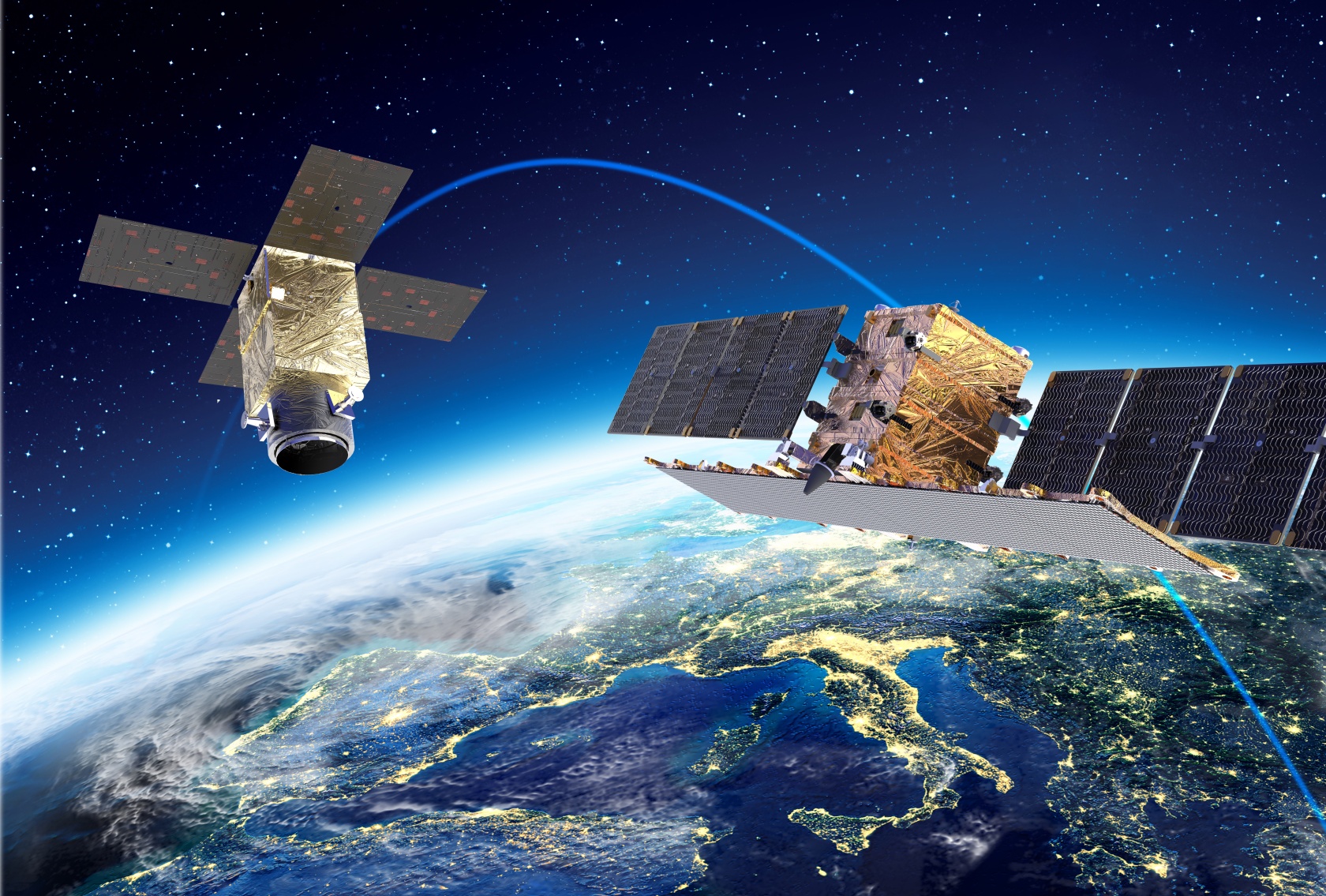
IRIDE © Thales Alenia Space
Thales Alenia Space, in partnership with the European Space Agency (ESA), signed two contracts for the IRIDE constellation set to become a pioneer in Earth observation for Italy and Europe. It also signed a historic agreement with PT Len Industri to supply the Indonesian Ministry of Defense with an advanced Earth-observation constellation based on its new all-in-one optical and radar solution. And the successful launch of the Syracuse 4B satellite consolidated Thales Alenia Space’s position as a leading supplier of military satellite communications.
Thales Alenia Space also joined the European Commission’s EuroHAPS project aiming to develop stratospheric demonstrators like our Stratobus airship to enhance current and future satellite-based intelligence, surveillance and reconnaissance (ISR) and communications capabilities.
Anniversary celebrations at four European plants

In Toulouse, the company celebrated 40 years of excellence in satellite altimetry, payloads, civil and military communications systems, satellite navigation and ground segments. And in Charleroi, Belgium, it marked its contribution to building Europe’s satellite and launcher industry over the last 60 years.
The Italian plants in Rome and L’Aquila also celebrated 40 years of expertise. The L’Aquila plant, specialized in the production of electronic equipment and structural parts for satellites, also marked the 10th anniversary of the infrastructures rebuilt in 2013 after the devastating 2009 earthquake. And Rome, focused on the design of space systems, Earth-observation radars and military communications satellites, remains Thales Alenia Space’s core strategic facility in Italy.
Promoting wellbeing at work and improving environmental performance
True to its values, Thales Alenia Space stepped up its diversity and inclusion efforts, notably during the European Week for the Employment of People with Disabilities (EWPD). The Cannes and Toulouse plants hosted workshops, conferences, exhibitions and partnership initiatives to consolidate their disability-friendly credentials and promote inclusion of their 6.8% disabled employees.
A Female Talents mentoring program was also rolled out to offer trust-based support for assignments and career advancement. This support scheme rounds out a coaching program open to all employees seeking to clarify their priorities, identify their strengths and weaknesses, explore their soft skills, and find solutions that match their environment and values. The company also deployed the Wittyfit solution to engage employees about their wellbeing and concerns at work, while Giving Tuesday and Generation Challenge sought to promote intergenerational solidarity and communication as a driver of performance.
With an eye on efforts to tackle climate change, Thales Alenia Space is resolutely embracing sustainable development through the ecodesign of its products and its corporate social responsibility (CSR) strategy. For instance, its Toulouse facility has one of the largest solar-canopy parking lots in France, reducing the site’s CO2 emissions by 65 metric tons a year, equivalent to the consumption of more than 630 homes. Other flagship initiatives include the Fresque du Climat (Climate Collage), a collaborative workshop set up in 2023 to raise awareness about climate change and limit the company’s environmental impacts and attendant pollution risks as far as possible.
Technologies helping to preserve our planet

First image of the Earth captured by MTG-I1 © EUMETSAT & © ESA
Over the past year, the SWOT satellite set new standards in Earth observation, delivering images with unrivaled precision of surface waters across the globe. Ultimately, SWOT is set to map 90% of Earth’s surface waters, providing the most comprehensive survey ever of our planet’s water resources. The first images from the MTG-I1 satellite marked a major step forward in detecting severe storms over Europe and Africa, confirming the mission’s potential to revolutionize detection and forecasting of extreme weather events.
Alongside these ambitious programs, Thales Alenia Space is leading ESA’s SOLARIS feasibility study designed to develop new space solar power (SSP) concepts. The company is also contributing to a digital Earth twin proof of concept for flood prediction under the European Commission’s Destination Earth (DestinE) initiative.
A year under the banner of innovation and New Space
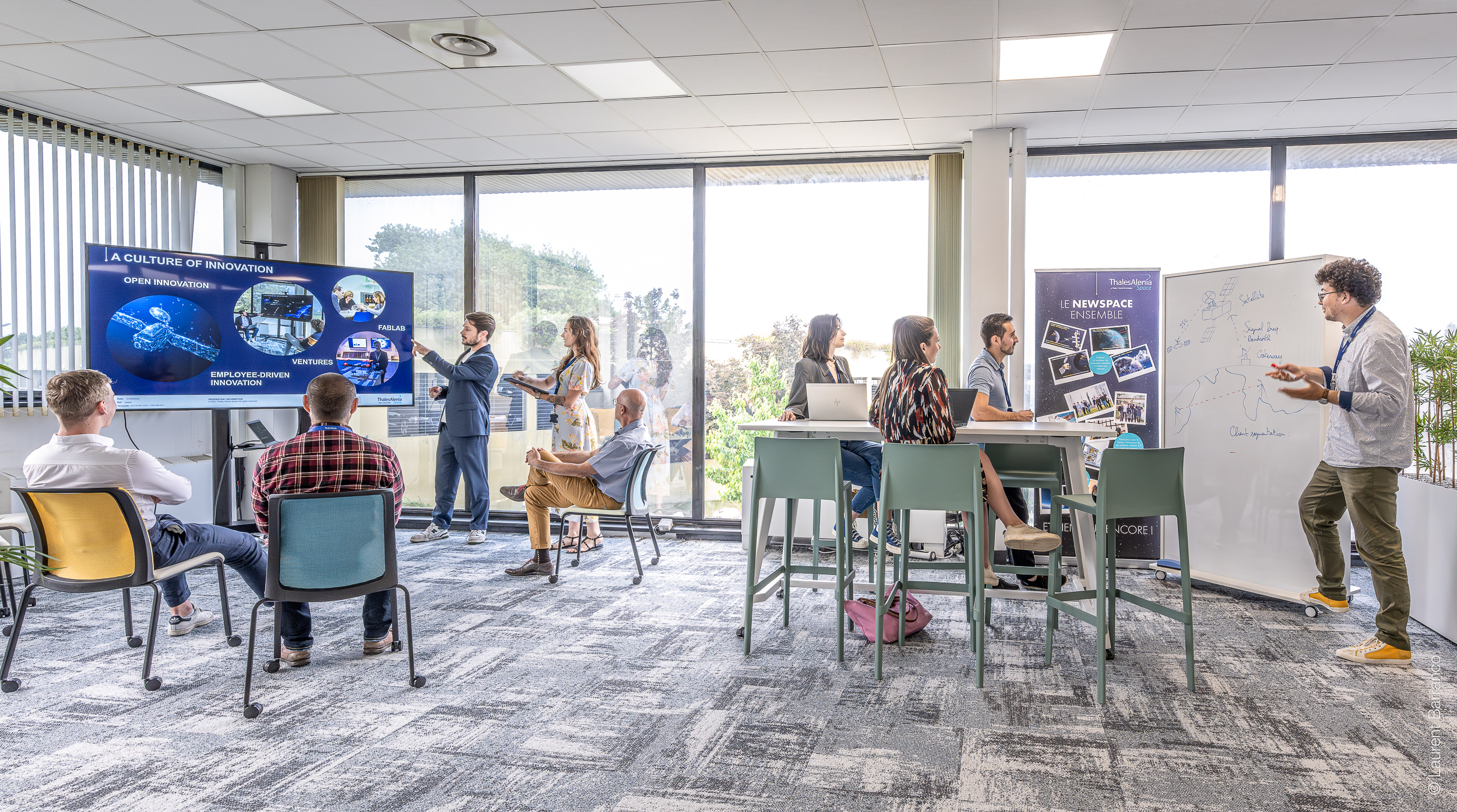
Space Business Catalyst © Thales Alenia Space/Laurent Barranco
Thales Alenia Space strengthened its leadership position in New Space with the creation of Space Business Catalyst, an innovative industry accelerator providing commercial, financial and technical support to disruptive intrapreneurs and startups working in this sector. This commitment to innovation was embodied in SiPack, a new assembly line for cutting-edge electronic chips in partnership with Synergie Cad PSC. SiPack is aiming to turn out 100,000 chips a year by 2025 as it seeks to become a go-to player in Europe for New Space, fabless manufacturing and the electronics and microelectronics industries.
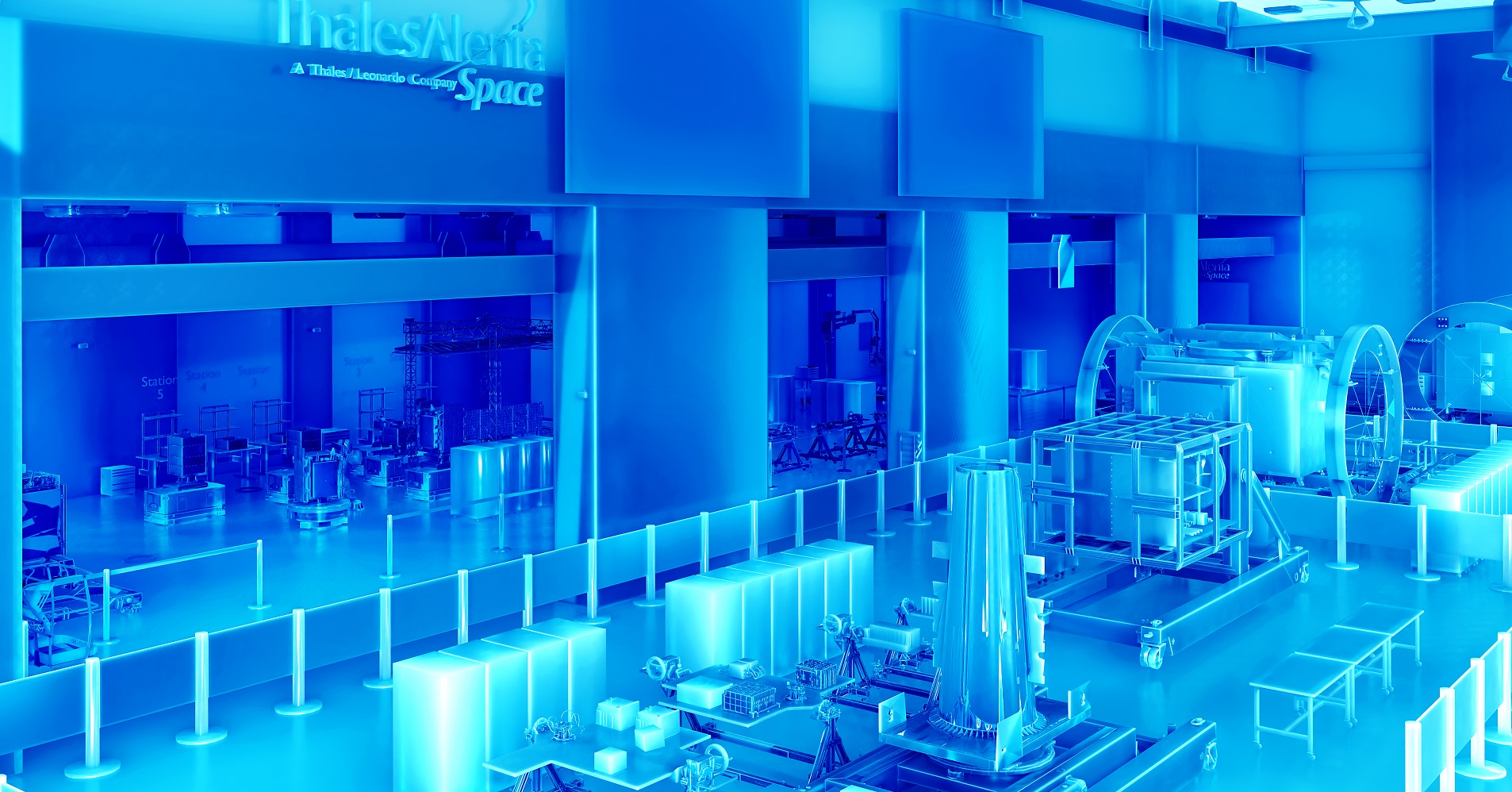
Space Smart Factory © Thales Alenia Space
Lastly, the announcement of the Space Smart Factory project marked a key milestone in efforts to build a more agile and more connected industry. This 21,000-sq.m factory will be one of the largest of its kind in Europe, employing Industry 4.0 technologies like digital modeling, digital twins, virtual and augmented reality, supply chain integrated simulators and automation through robots and cobots.


